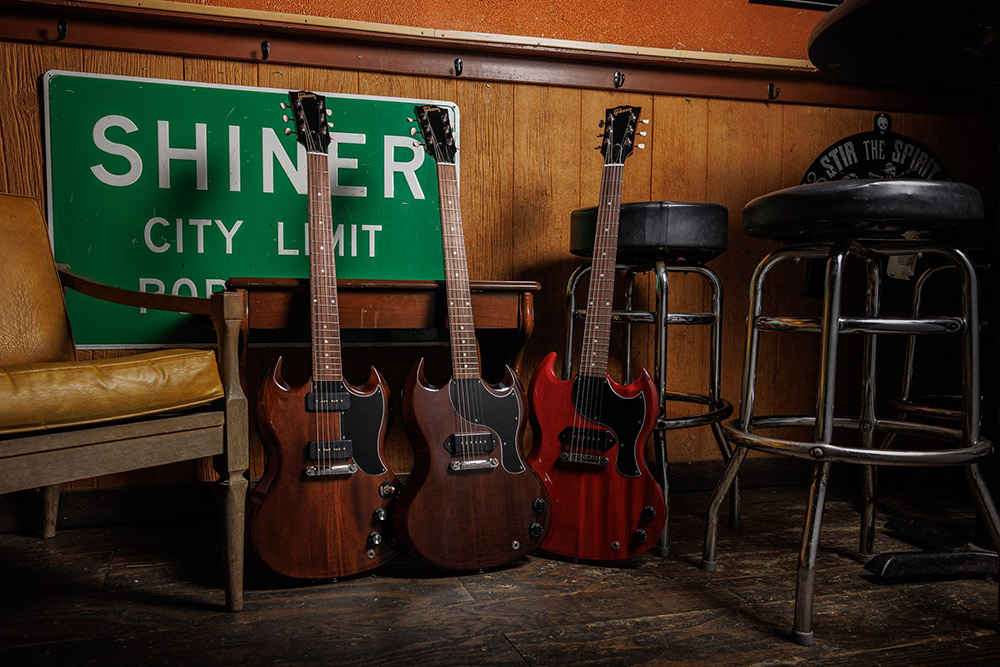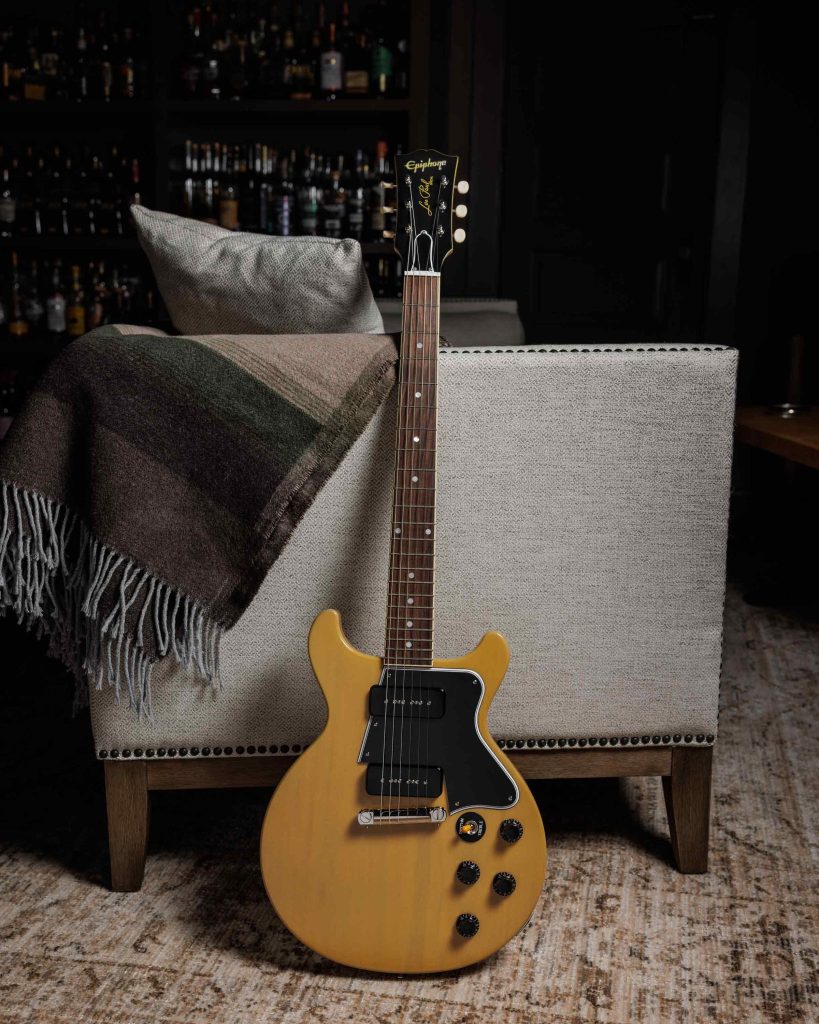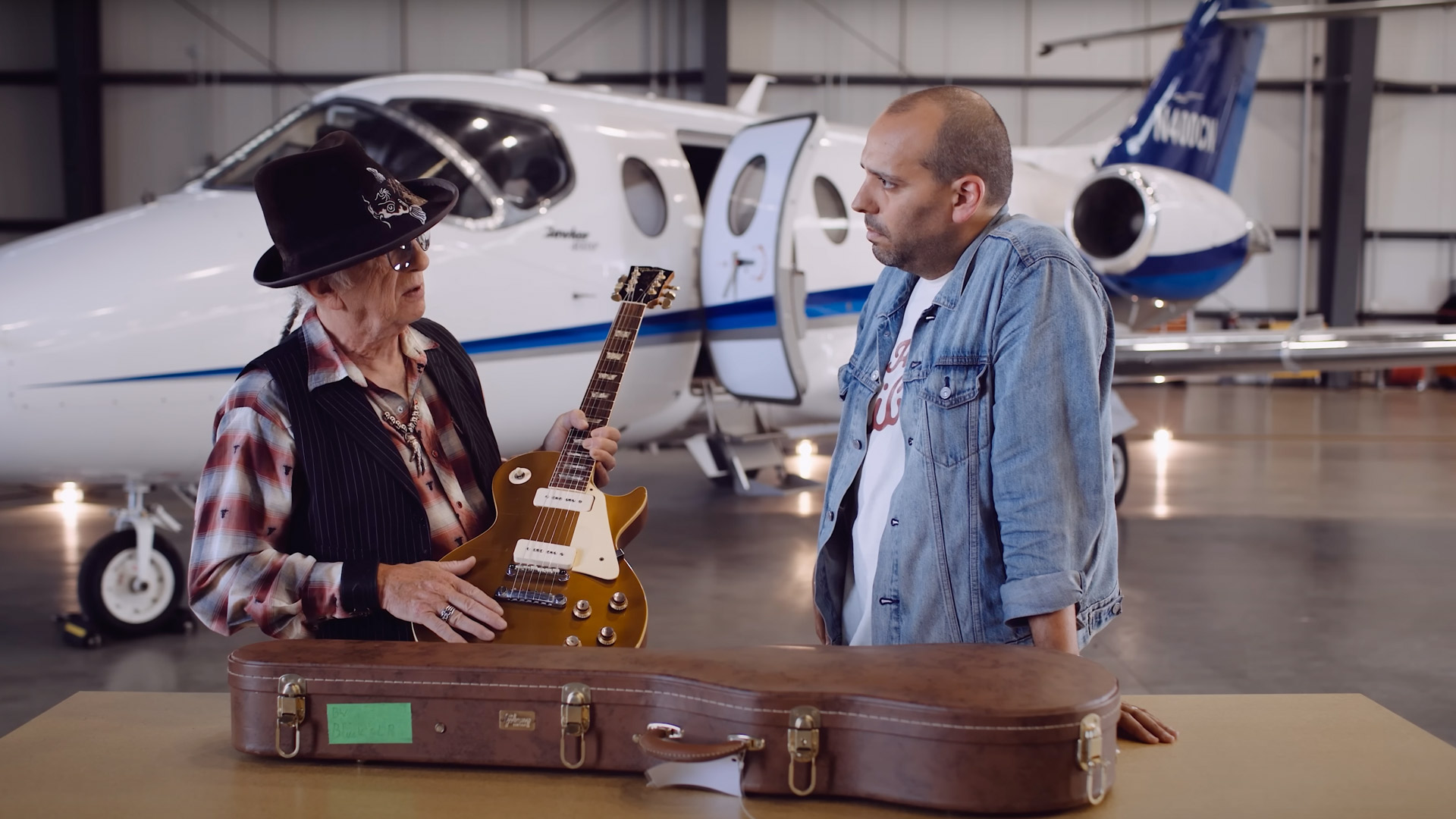In this Gibson TV video, hear in detail what makes the P-90 pickup a weapon of choice among iconic guitar players
Guitars equipped with P-90 pickups and the legendary players who rely on them continue to prove why this iconic single-coil design remains one of the most expressive and versatile sounds in electric guitar history. The P-90 is one of the most unique-sounding pickups, keeping us, as players, enthralled.
But have you ever wondered why some of the most legendary guitarists still choose guitars with P-90 pickups and continue talking about the mystique behind them? It’s not just about vintage mojo. From classic rock riffage to raw punk energy, that punchy, midrange-forward tone has been shaping records and ripping through live shows since the day they were invented in 1946.
In this Gibson Gazette article, we find out the reasons why the A-list players featured in a special episode of The Collection on Gibson TV simply love the P-90 pickup. From Jason Isbell’s “unpredictable” studio weapon to Mike Campbell’s “Stonesy” Firebird™, these guitars are all equipped with one thing in common: the mighty P-90. Watch the full episode of The Collection:
If you’re watching the video via the Gibson Gazette, here are the timestamps:
- 0:00 Brad Whitford of Aerosmith’s 1968 Gibson Les Paul Goldtop
- 2:06 Joe Bonamassa’s 1963 Gibson SG Special
- 3:42 Kirk Hammett’s 1960 Gibson Les Paul TV Special
- 6:15 Rick Nielsen’s 1959 Gibson TV Junior
- 8:11 Mike Campbell’s unique 1965 Gibson Firebird III
- 10:11 Charlie Starr’s 1955 Gibson Les Paul Junior
- 13:44 Jason Isbell’s 1953 Gibson Les Paul Goldtop
Brad Whitford’s Goldtop with a story
Brad Whitford of Aerosmith opens the video with a Goldtop that you have definitely heard, explaining, “This is the one that replaced my original.” After losing his first Les Paul™ (the one we’ve all heard as it was featured on the first Aerosmith album), he found this 1968 model in Boston. From its natural lacquer checking to its “oomph-packed” neck, Brad shares stories of winter gigs and the finish shattering in real time when he opened the case in cold weather.
“It’s got a beautiful neck on it. Plays great. Plays beautifully,” Brad says. “I think this one has a little more oomph to it.” Check out the 1968 Les Paul Standard Goldtop Reissue, which is similar to the one you see here.
Joe Bonamassa’s secret weapon
Joe Bonamassa gushes over one of his favorite Gibson SG™ guitars, a clean 1963 SG Special™ in Polaris White, stating, “These are just great, man. Great power, rhythm, solo guitars.” He loves the pickup arrangement and describes it as “how you P-90.” The P-90 pickups here, especially when coupled with the SG body, offer a sharp attack with full-bodied sustain, which is perfect for searing leads and crunchy riffs. And yes, they can do crunchy riffs. Just ask Tony Iommi.

Pictured: Gibson.com exclusive SG Special and SG Junior
Kirk Hammett’s reggae-inspired Les Paul
Kirk Hammett of Metallica surprises with a TV Special with the word “Tosh” on it, likely once belonging to reggae legend Peter Tosh. “I love Bob Marley… I’m a huge reggae fan,” Kirk shares, noting that the guitar’s flatter neck and the tonal clarity of its Soapbar P-90s make it perfect for reggae-style “skanking” and warm rhythm playing.
Rick Nielsen’s punk-rock favorite
Rick Nielsen of Cheap Trick brings out a beat-up TV Junior and delivers a masterclass on why these guitars are so loved. “I probably had 50… they were cool, and you could afford them,” he recalls. Watch as Mark Agnesi and Rick dive into why Rick loves the Les Paul Junior and why he adores the P-90 sound.
Mike Campbell’s transitional Firebird
Mike Campbell’s 1965 Firebird III is a rare transitional model that you would be very hard-pressed to find. While most Gibson Firebird guitars came with Firebird mini humbuckers, this one sports a pair of cream P-90s, which is unique to this guitar. “Every time I walk by it, I go, that’s really cool,” Mike says. Its Rolling Stones-style tone—gritty, jangly, and just rough enough—makes it a standout in his studio.
Charlie Starr’s tour workhorse
Charlie Starr of Blackberry Smoke introduces us to his number one Gibson Les Paul Junior, which, if you’re a Blackberry Smoke fan, you will have heard. With stainless steel frets and perfect bridge-to-pickup alignment, as he puts it, this guitar is his workhorse model that comes out for gigs, tours, and recording. “This one goes on every tour… probably my favorite tones on the new record [Be Right Here],” Charlie explains. The P-90 delivers thick, gritty slide tones and defined note separation, even when the gain is cranked. “It goes from sparkly clean to general destruction,” he adds. “Which I love.”
Jason Isbell’s unpredictable studio monster
Jason Isbell rounds out the video with his 1953 Goldtop, which is green and heavily checked and modded with a Bigsby® by tech Larry Craig. He turns to it when he wants something that sounds “like it’s impossible to completely control,” with the P-90 in the neck position delivering clean sparkle and a twist of chaos, perfect for standing out in a studio mix. “You can make it sound like a jazz box or a Strat™,” he explains. “And then it just melts into noise when you turn up.” Just another incredible Gibson Les Paul that is part of his collection.

Pictured: Epiphone Inspired by Gibson Custom 1960 Les Paul Special Double Cut Reissue
Final thoughts on P-90 pickups: Simple guitars, serious tone
Although the guitars in the video might be vintage, they aren’t just museum pieces. They’re real gigging guitars still going after decades of use, still being used to record albums, light up stadiums, and shape signature tones. Whether you’re into rootsy slide, face-melting leads, or warm, clean rhythm parts, the P-90 gives you all the tone, feel, and attitude you need, and these artists prove it.
What is the P-90 sound?
The sound of a P-90 has a tonal identity that sits between the sparkle of a smaller single-coil and the punch of a humbucker™, delivering a broad midrange voice that is incredibly dynamic. I personally think it’s the perfect middle ground between a humbucker and a single coil. The power and the warmth.
The P-90 pickup remains one of the most expressive tools in a guitarist’s arsenal—and yes, they can do metal. From Jason Isbell’s studio work, heard on albums like Reunions, to Mike Campbell’s jangly, Stones-inspired textures on Mojo with Tom Petty and the Heartbreakers, the P-90 provides players with a natural, open sound that responds beautifully to dynamics and picking style alike.
Humbuckers vs P-90 pickups
Where humbuckers tend to compress and smooth out the signal, the P-90 pickup maintains a raw, detailed response. Rolling back the volume reveals articulate cleans, while pushing it opens up a gritty, mid-forward bite that cuts through live mixes with ease.
The construction is different, with a larger coil than a typical single coil, but it still maintains a single winding coil. This offers a wider frequency range and more harmonic content. That’s what makes a guitar like Rick Nielsen’s TV Junior a perfect fit for Cheap Trick’s early, raucous energy, or why Charlie Starr can swing from articulate slide work to full-blown overdrive without losing note definition, just by adjusting the volume control.
Gibson’s Mat Koehler notes that Soapbar and Dogear versions each bring subtle tonal shifts due to their different mounting styles and resonances. As seen in episodes of The Collection and another video from the Gibson Gear Guide below, the P-90’s dynamic touch response and ability to reproduce overtones make it a true player’s pickup—versatile, expressive, and still unmistakably its own sound, which I can almost guarantee you’ll fall in love with.
Watch another video with guitarists talking about why they love a P-90 pickup. There’s definitely a theme here!
Who plays P-90 guitars?
When you ask “Who plays P-90 guitars?,” you can count Tony Iommi (Black Sabbath), Jared James Nichols, Mike Campbell (Tom Petty and the Heartbreakers), Jason Isbell, Charlie Starr (Blackberry Smoke), Brad Whitford (Aerosmith), Rick Nielsen (Cheap Trick), Kirk Hammett (Metallica), and Joe Bonamassa among the devoted, along with thousands more.
Need a P-90-equipped guitar? Both Gibson and Epiphone have models that fit the bill.

